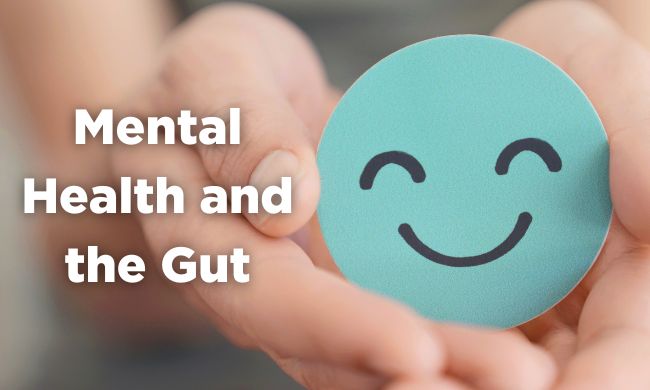Have you ever had a pit in your stomach? Or felt a sense of dread that may have left your mouth dry and caused a wave of nausea at the mere thought of food? Anxiety and stress are normal emotions that we all go through, however consistently being tense during meal-times could cause discomfort and poor digestion. In this blog, we’ll discuss the links between mental health and the gut, then get you up to speed with the latest scientific developments on how we can monitor this connection.
Mental Health and Gut Health.
The thought that mental health is connected to gut health is an ancient idea. For example, the South Asian holistic approach to health called Ayurveda encourages mindful practices such as yoga and meditation alongside a diet of specific spices and wholefoods to promote both good gut health and overall wellbeing.
Can your gut affect your mental health? Recently, scientific studies have confirmed previous intuitive beliefs that individuals with gut problems like irritable bowel syndrome (IBS) are three times more likely to have anxiety or depression (1). The connection goes both ways, meaning that poor gut health might contribute to poor mental health and vice versa. This has inspired a recent shift towards cognitive behavioural therapy for people suffering from gut issues as well as using dietary interventions for mental health.
A key piece of the gut health puzzle are the thousands of tiny bacteria, viruses, fungi, and other microorganisms that live inside your digestive tract, known as the gut microbiome. The diversity and number of different microbes can have both positive and negative effects.
For example, some bacteria benefit us by helping to break down and digest our food, whereas other types can make us very sick. For example, certain E. coli species protect us from bacterial overgrowth in the gut, whereas other strains that are sometimes found in raw meat are dangerous to ingest, causing an array of unpleasant symptoms.
The gut microbiome may therefore be a key indicator of overall health. Part of the reason why the evidence is not clear-cut, is because everyone is unique. The gut microbiome is constantly changing and evolving as it responds to what we eat. Deep-fried foods have been found to promote the growth of bacteria which create inflammatory by-products. These can harm the intestinal lining, reducing its ability to absorb nutrients (2).
When such bacterial colonies multiply, beneficial bacteria die. This means the harmful colonies grow in numbers, inducing cravings for unhealthy foods. For example, highly sugary foods are not only addictive, but also tend to cause energy crashes and depressive effects after eating (3). On the other hand, eating a variety of whole foods as well as probiotics can help create a positive environment that benefits not only the body, but the mind as well.
Can poor gut health affect your brain? Interestingly, the collective microbes in your gut produce about 95% of the serotonin in your body. This is a type of neurotransmitter, a chemical that bounces around in the brain and regulates our mood. Higher levels of serotonin can make you feel calm and satisfied.
Certain foods like oats, chicken, and peanuts contain the amino acids (the building blocks of protein) that are needed for serotonin to be produced. Microbes in the gut can also help us feel ‘full’ after a meal and produce dopamine, another mood related neurotransmitter which is directly linked to feelings of motivation and pleasure.
Why is mood so closely linked to the gut? This is partly because 500 million neurons line the digestive tract. Scientists call the network of nerves the gut-brain axis as they send signals that mainly travel through one main pathway, the vagus nerve. It runs through the centre of the body, from the brain to the gut and may help explain why feeling nervous makes your tummy turn. If you would like to know more about the gut-brain axis, read our dedicated blog.
Experiencing digestive issues can contribute to feelings of social anxiety around meetups, including something as simple as a coffee break, let alone a three-course meal. Stressing about which foods might cause you problems might in fact be causing the majority of the problem in the first place (4). This can make it difficult to distinguish between symptoms and figure out if your upset stomach is causing you grief or if outside stressors are causing your stomach to tense up. Luckily, OMED Health is here to help.
How can OMED Health help?
Your journey with OMED Health begins by purchasing the OMED Health Breath Analyzer. Once you receive your device, you can start using the OMED Health App to take breath samples and log your symptoms, meals, stress levels, exercise, and other lifestyle factors. This data provides a detailed view of your gut health and how it responds to daily habits and triggers.
By enrolling in an OMED Health Plan, you gain access to a clinically guided pathway. Our in-house doctor can use your breath data and symptom history to support the diagnosis of conditions such as SIBO (Small Intestinal Bacterial Overgrowth) or IMO (Intestinal Methanogen Overgrowth). If a diagnosis is made, we will guide you through an appropriate treatment plan tailored to your condition.
The Breath Analyzer continues to play a key role during treatment by allowing you to monitor changes in your hydrogen and methane levels over time. This helps assess how your body is responding and provides valuable feedback for adjusting your care. Combined with lifestyle tracking in the app, you can better understand what influences your gut symptoms and make informed decisions about your health.
Purchase the OMED Health Breath Analyzer today to begin a science-led, clinically supported journey to better gut health.
References
- Staudacher HM, Black CJ, Teasdale SB, Mikocka-Walus A, Keefer L. Irritable bowel syndrome and mental health comorbidity — approach to multidisciplinary management. Nat Rev Gastroenterol Hepatol. 2023 Sep;20(9):582–96.
- Gao J, Guo X, Wei W, Li R, Hu K, Liu X, et al. The Association of Fried Meat Consumption With the Gut Microbiota and Fecal Metabolites and Its Impact on Glucose Homoeostasis, Intestinal Endotoxin Levels, and Systemic Inflammation: A Randomized Controlled-Feeding Trial. Diabetes Care. 2021 Sep;44(9):1970–9.
- Akbaraly TN, Brunner EJ, Ferrie JE, Marmot MG, Kivimaki M, Singh-Manoux A. Dietary pattern and depressive symptoms in middle age. Br J Psychiatry. 2009 Nov;195(5):408–13.
- De Petrillo A, Hughes LD, McGuinness S, Roberts D, Godfrey E. A systematic review of psychological, clinical and psychosocial correlates of perceived food intolerance. J Psychosom Res. 2021 Feb 1;141:110344.
- Morreale C, Bresesti I, Bosi A, Baj A, Giaroni C, Agosti M, et al. Microbiota and Pain: Save Your Gut Feeling. Cells. 2022 Mar 11;11(6):971.



